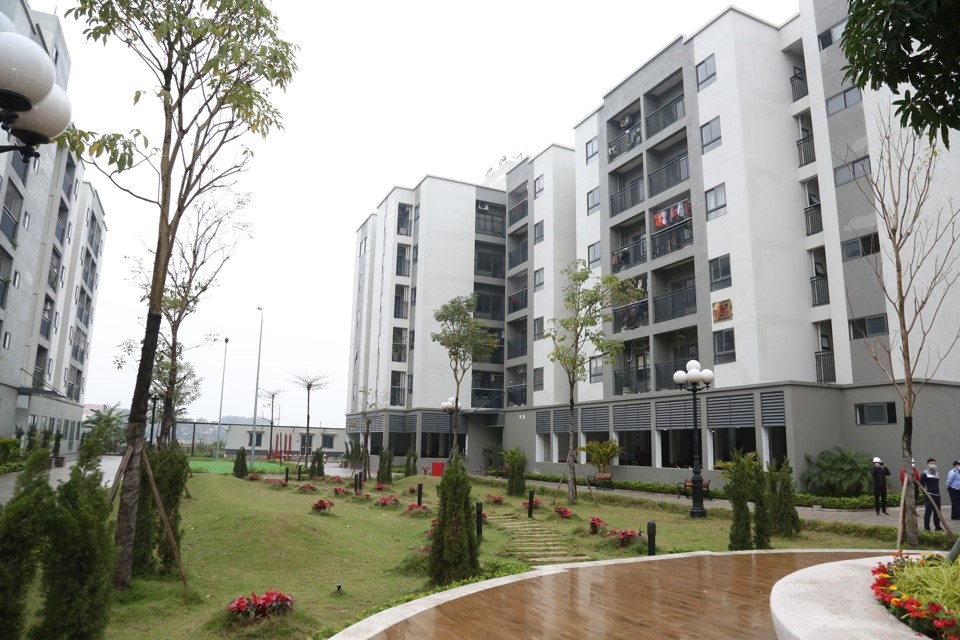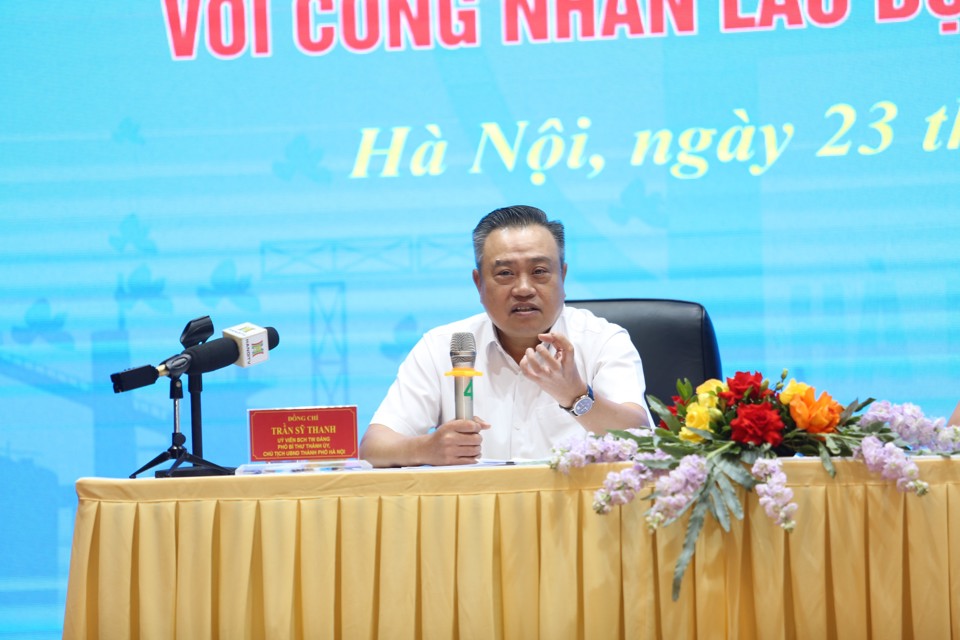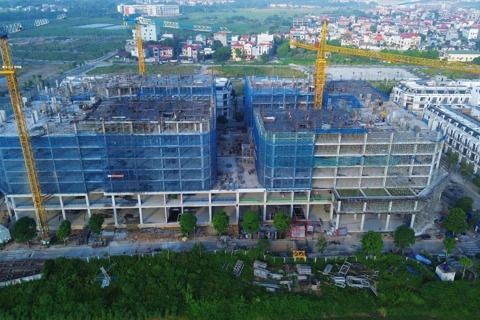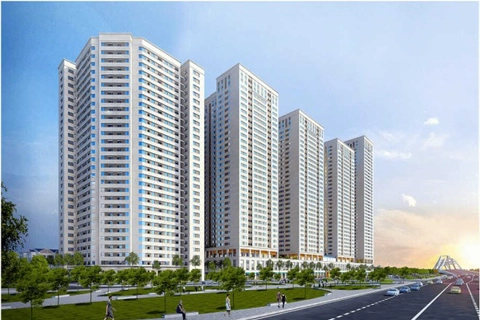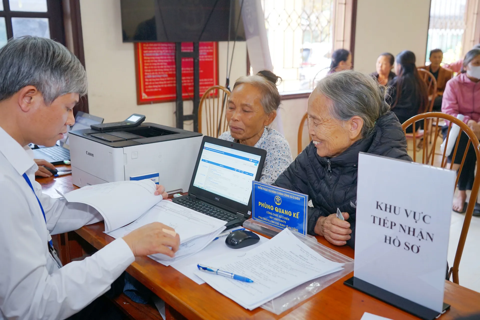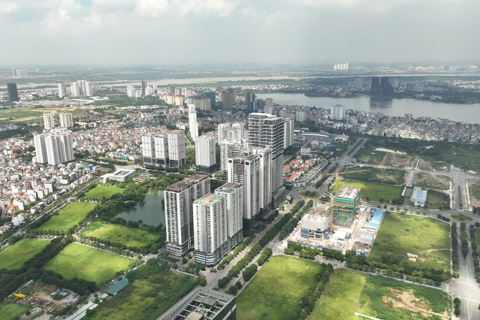Hanoi to add 8,300 apartments to social housing reserves by 2029
Along with relieving housing pressure in central urban areas, the new social housing projects will also help to expand residential zones beyond the city's borders.
Hanoi is set to launch six new social housing projects, providing over 8,300 apartments across the districts of Long Bien, Ba Dinh, and the suburban areas of Thach That and Thanh Tri.
The six new social housing projects in Hanoi will provide the market with more than 8,300 apartments, equating to over 655,000 square meters of floor space.
Costing a total investment of nearly VND6 trillion (US$242,000), most of the site clearance has been completed, and the projects are currently under implementation, with expected completion dates set for the 2026-2029 period.
| Social housing at Thanh Lam - Dai Thinh Urban Area in Me Linh District, Hanoi. Photo: Hai Linh |
These large-scale projects are a significant step towards improving housing availability for low-income families in Hanoi. By addressing the urgent need for affordable homes, the initiative is expected to ease housing shortages while contributing to the city's overall socioeconomic development.
The projects will also support the expansion of residential areas into districts like Long Bien, Ba Dinh, Thach That, and Thanh Tri, helping Hanoi achieve a more balanced urban landscape.
These projects aim to address the growing demand for affordable housing, particularly for low-income families and individuals, as part of the city's broader urban development and social welfare strategies.
The new social housing projects will not only alleviate pressure on housing in central urban areas but also support the expansion of residential zones in the city's outskirts. By providing quality housing at affordable prices, the initiative is expected to offer more opportunities for residents to own homes and improve their living conditions.
This plan aligns with Hanoi’s long-term goals of sustainable urban development, reducing overcrowding in the city center, and enhancing the overall housing infrastructure for diverse socioeconomic groups. These projects will play a key role in improving living standards and fostering balanced urban growth.
Hoan Kiem District Dispersal Housing Area: Aimed at reducing the dense population in the Hoan Kiem District, this project focuses on relocating residents from overcrowded areas and providing them with affordable housing in more spacious developments.
Housing for Sale to Low-Income Earners of Ba Dinh District Police: This project is specifically designed to provide housing for low-income police officers working in Ba Dinh District. The goal is to offer affordable housing options for police personnel, ensuring they can live in safe and comfortable conditions close to their workplace.
Social Housing for Sale to Officers and Soldiers of the Ministry of Public Security: This development is targeted at officers and soldiers of the Ministry of Public Security, offering them affordable housing. It is part of a larger initiative to support those in public service by making homeownership more accessible to them.
Social Housing in Bac Phu Cat Residential Area: Located in the Bac Phu Cat area, this project aims to provide social housing for residents in suburban areas, offering them affordable options with access to essential amenities and services.
Social Housing in CT Plot of CT1 Planning Block, Investment Project to Build Technical Infrastructure for Auctioned Land in Long Bien Ward: This housing project in Long Bien is part of a broader plan to develop auctioned land with supporting technical infrastructure. It aims to deliver affordable housing to a growing population in this district, helping alleviate pressure from the city center.
Social Housing in Plot C14/NO1 of Phuc Dong Ward: Another significant project in Long Bien District, this development in Phuc Dong Ward will provide social housing to address the needs of low-income earners, offering them quality homes at affordable prices.
These projects reflect Hanoi's ongoing commitment to creating affordable housing solutions and ensuring that essential public service workers, including police officers and soldiers, have access to safe and comfortable living spaces. The combination of these developments is expected to make a substantial contribution to addressing the city's housing shortages.
Meanwhile, Hanoi needs to finish 18,700 apartments by 2025 in order to meet the government's goal of developing at least 1 million social housing units. But the city has only finished about 28% of the designated target in the last four years.
During a working session with the Supervisory Delegation of the National Assembly in July, Vice Chairman of the Hanoi People's Committee Duong Duc Tuan stated that the city has added roughly 15 sizable land plots to invest in social housing projects, with approximately 2,000 units per plot.
| Chairman of the Hanoi People's Committee Tran Sy Thanh at the dialogue with the city's workers held in Thach That District on May 23. Photo: Pham Hung/The Hanoi Times |
Chairman of the Hanoi People's Committee Tran Sy Thanh has been actively involved in promoting social housing initiatives in the city. His leadership plays a crucial role in accelerating the development of affordable housing projects to address the growing need for homes among low-income earners, government employees, and other vulnerable groups in the capital.
Over the past time, Hanoi has reaffirmed its commitment to expanding the social housing sector. The city's development plans emphasize providing affordable, high-quality housing for low-income residents, including workers, public servants, and officers in sectors like the Ministry of Public Security. This is part of a broader vision to promote equitable access to housing as Hanoi continues to urbanize rapidly.
He has pushed for faster approval and implementation of social housing projects. One of the main challenges for these projects has been slow administrative procedures, but Thanh has urged local authorities and investors to expedite land clearance, design approvals, and construction permits to meet the city's rising demand for housing.
Thanh has emphasized that social housing developments must maintain a high standard of living conditions. He advocates for stronger collaboration between the government and private developers to expand the scope and scale of social housing.
The chairman views social housing as a vital component of Hanoi’s overall urban development strategy. His approach focuses on integrating social housing into the city's larger infrastructure projects, such as transport hubs, ensuring that residents have convenient access to public services and can commute easily. This strategy helps balance urban growth while addressing housing shortages.

